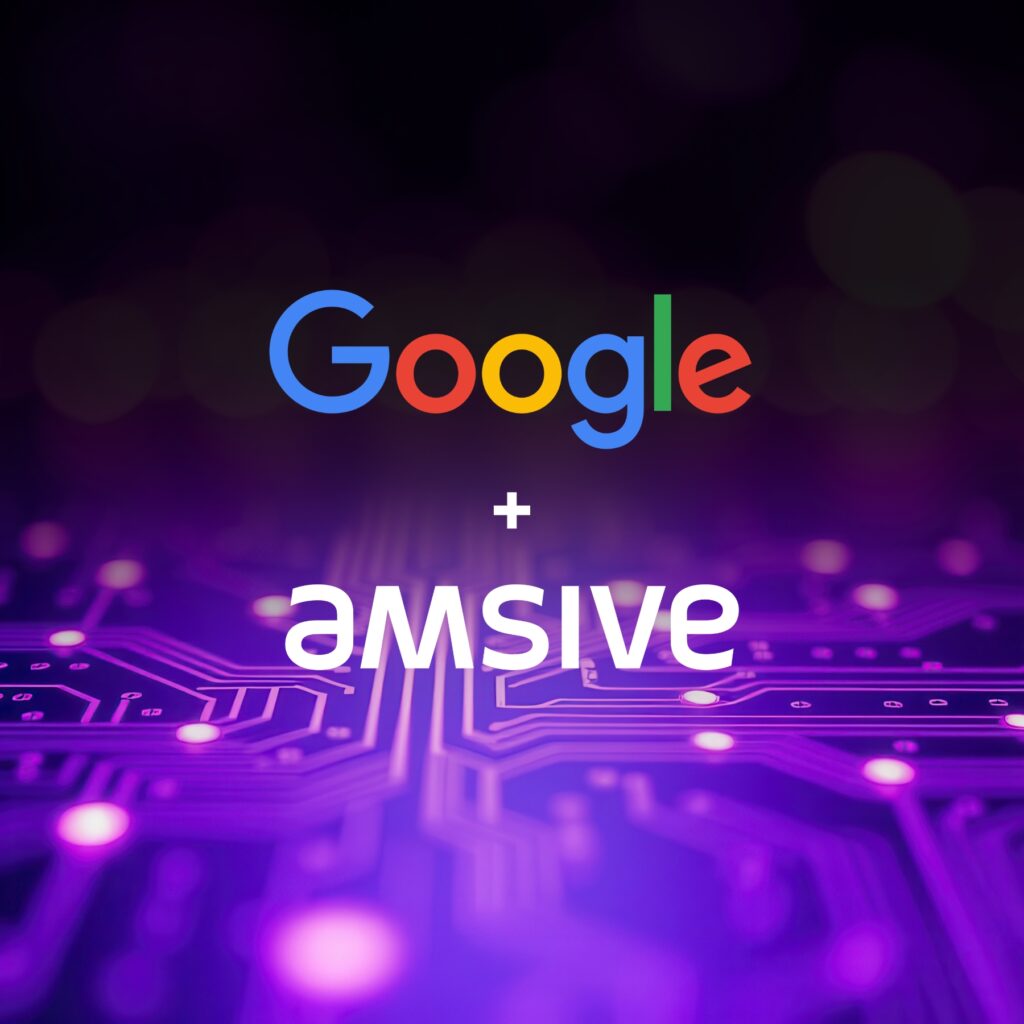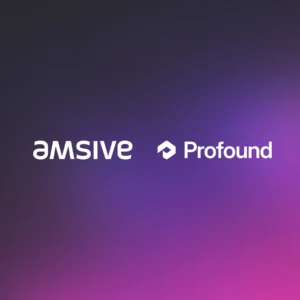Adapted from Lily Rays’ Mozcon 2022 Presentation
Jump to: E-A-T at work today | How E-A-T has become extremely important for SEO | The rise of real subject-matter experts | What does real expertise look like? | How to analyze and improve your site’s perceived expertise | MozCon 2022 presentation slides | (VIDEO) The Importance of Expertise in SEO
The focus on expertise, authority, and trustworthiness (E-A-T) comes directly from Google’s Search Quality Evaluator Guidelines, a document that’s used to train human search quality evaluators who participate in thousands of tests Google conducts each year, in order to confirm that Google’s results are meeting the quality expectations laid out in the quality guidelines. E-A-T is the criteria Google’s Quality Raters use to evaluate content, authors, and website and is synonymously used with page quality throughout the quality guidelines.
Google has framed E-A-T as one of the most important factors for achieving optimal SEO performance in the past few years.
How do we know E-A-T is becoming so crucial for SEO success? There are many examples of Google validating the importance and significance of E-A-T throughout the past few years. For starters, Google’s Search Engine Optimization (SEO) Starter Guide states, “cultivate a reputation for expertise and trustworthiness in a specific area” and that “expertise and authoritativeness of a site will increase its quality.”
Are you looking to improve your performance after a core update? Danny Sullivan, Google’s public search liaison, said, “Get to know the quality rater guidelines and E-A-T.” These words live in an article that Google has shared every time a core update rolled out for the past three years.
Want to rank in Google Discover or Google News? Sullivan also wrote, “make sure you’re regularly producing original news content that is high in expertise, authoritativeness, and trustworthiness.”

Want to rank better after the 3 Product Reviews Updates rolled out between 2021 and 2022? Alan Kent, a Google Developer Advocate who handled communications about the updates, wrote, “express expert knowledge about products, where appropriate.” With three updates within just the past year, the Product Reviews Updates were significant for websites focused on product reviews, plus many other ecommerce and informational sites that were affected by the ranking volatility.
Looking to rank better on YouTube? YouTube, owned by Google, has documentation about the importance of authority for rankings, especially as it relates to combating misinformation. In its section about elevating quality information, YouTube’s guidelines indicate that they “use machine learning systems that prioritize information from authoritative sources.”
Google has also mentioned that E-A-T will matter more during times of crisis, as stated in a 2019 whitepaper about how Google fights disinformation. “We have designed our systems to prefer authority over factors like recency or exact word matches while a crisis is developing.” Google does this as a means of eliminating fake news from spreading, which often leverages those tactics in an attempt to exploit Google’s algorithms. In times of crisis, Google elevates authoritative sources, as demonstrated by several of our analyses over the past few years of the coronavirus pandemic.
Implicit and explicit references to E-A-T are tucked into many different facets of Google’s documentation over the past few years. Here’s what E-A-T looks like at home in the search results.
E-A-T at work today
There are a few ways E-A-T has been manifesting itself directly into the search results. One big update is Google’s “About This Result.” You might have noticed that now when you search on Google, you see three small dots on the upper right-hand corner of each organic result. If you click on the triumvirate of dots, it expands into a small pop-up to give you more context about the results, including:
- What is this site
- Why should you trust it
- Why Google chose this result
- Additional Wikipedia information (if available)
- How long it has been indexed on Google
- How it’s an organic instead of a paid result

“About This Result” is a way for Google to provide transparency directly within the search results.
Another example of E-A-T within Google’s results is through the new “Highly Cited” label that’s being included in Top Stories. If one Top Story, an article, is serving as the basis of information for other Top Stories, the main source could potentially be labeled as “Highly Cited.” This update ties into Google’s previous documentation about its intent to elevate original reporting in search. What does this mean? The people that break the news and provide original information are going to be algorithmically rewarded above those who are linking to, citing, and essentially rehashing what was first reported. With this update, Google is going to do its best to elevate the original source of information, yet another manifestation of E-A-T.
Here’s one more example of what Google might be doing with E-A-T, spotted within the SEO industry. Two people have the name, Brodie Clark. Both people are represented in the search results. Brodie Clark, a British civil servant, owns the right-side Knowledge Panel, but Brodie Clark, an Australian SEO professional and content writer, is shown in a carousel of articles that he’s written on major SEO platforms.
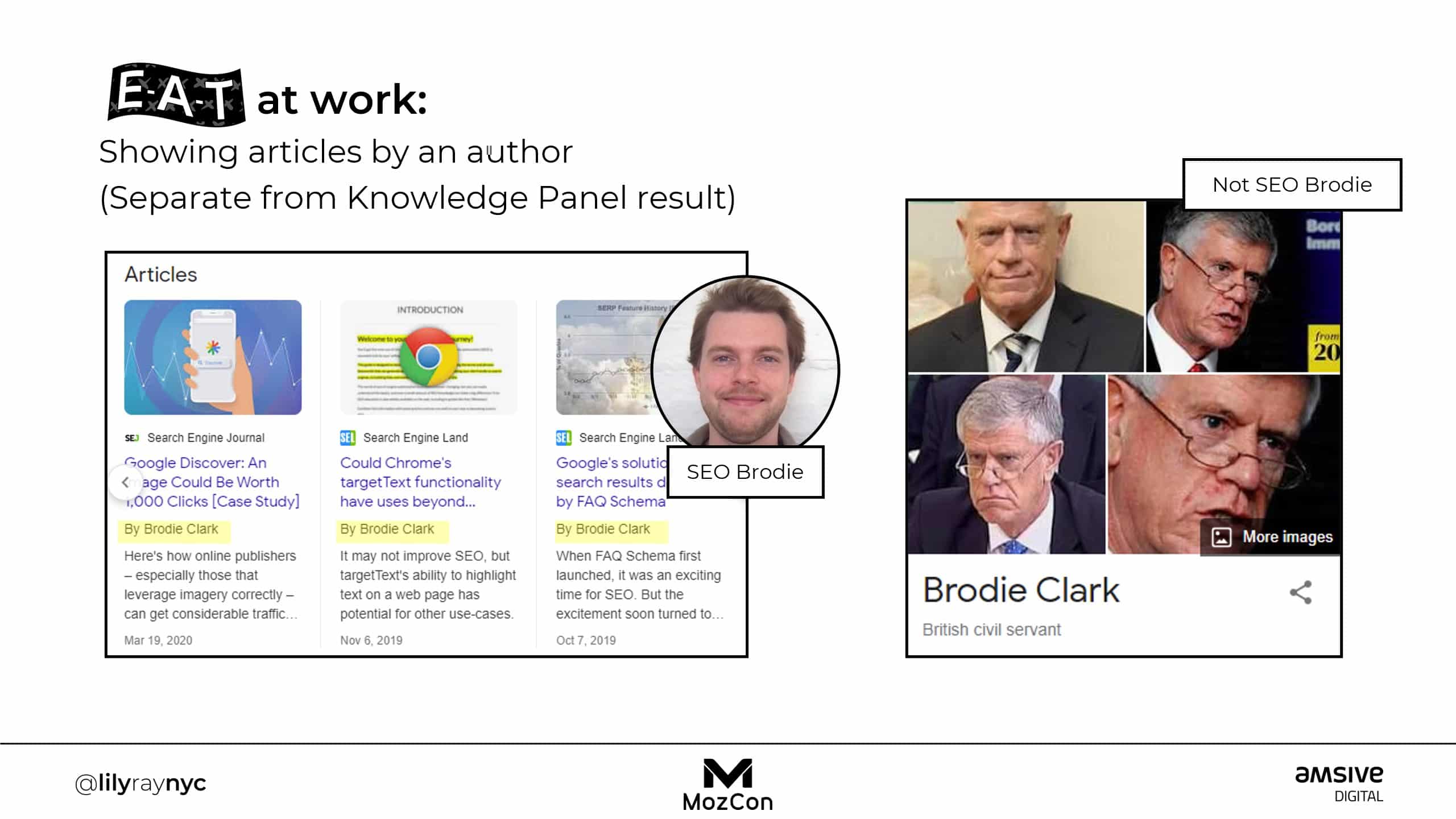
This is a great example of Google’s ability to identify and disambiguate entities who share the same name. Plus, the article carousel is interesting because, at the time these screenshots were collected, SEO Brodie was not recognized as an entity in Google’s Knowledge Graph. Instead, Google presented SEO Brodie as an entity directly in the search results. This is a testament to what Google’s been doing for many years with authorship and trying to identify individual entities and authors who publish content and surface that content directly in the search results.
How E-A-T has become extremely important for SEO
How has the SEO community responded to the importance of E-A-T? In some ways, SEOs have attempted to “E-A-T all the things,” in an attempt to take shortcuts without actually doing the work. Thinking about E-A-T as finishing salt that can be sprinkled over content for a final kick of flavor is unfortunately not how things actually work.
Improving your E-A-T isn’t a simple process. Many SEOs have used the recent guidelines around E-A-T by looking for shortcuts, such as adding fake author bios, updating publication dates without making content changes, or claiming their companies won awards they didn’t. Adding superficial or inaccurate elements of E-A-T, without thoroughly updating the content and ensuring its actual expert information, is insufficient. Trying to game the system with band-aids and shortcuts is usually not sufficient to trick Google that your site demonstrates good E-A-T. Google’s algorithm is sophisticated enough to sniff out attempts to create E-A-T where there is actually a real lack in expertise, authority and trust.
So, over the past few years, it’s likely that Google has been saying, “it’s time to get smarter about how we measure and evaluate E-A-T.” Instead of trying to sneak through a side door by adding meaningless bells and whistles to your website, your E-A-T-focused SEO strategy should be focused on the foundational elements of what it means to have good E-A-T. At the end of the day, it’s about who you are and what you say.
Core algorithm updates are how Google makes improvements to its system and addresses content overall.
There are several big core algorithm updates a year. Over the past few years, they’ve been particularly confusing for many search marketers. Since the Medic update, which disproportionately impacted health and medical sites, there have been many updates that seem to tie back to E-A-T. These recent core updates can create massive volatility in terms of rankings, visibility, and organic traffic, especially in “Your Money, Your Life” (YMYL) categories. YMYL is defined as any topics related to health, finance, security, politics, law, etc., that have a material impact on users’ health, well-being, and safety. For these topics, E-A-T matters more. It makes sense; searches for ‘heart attack”, “401K” or “COVID vaccine” are keywords that have a significant impact on user’s health, safety, and financial security. These core algorithm updates can be a way in which Google is reevaluating E-A-T (among many other factors) algorithmically.
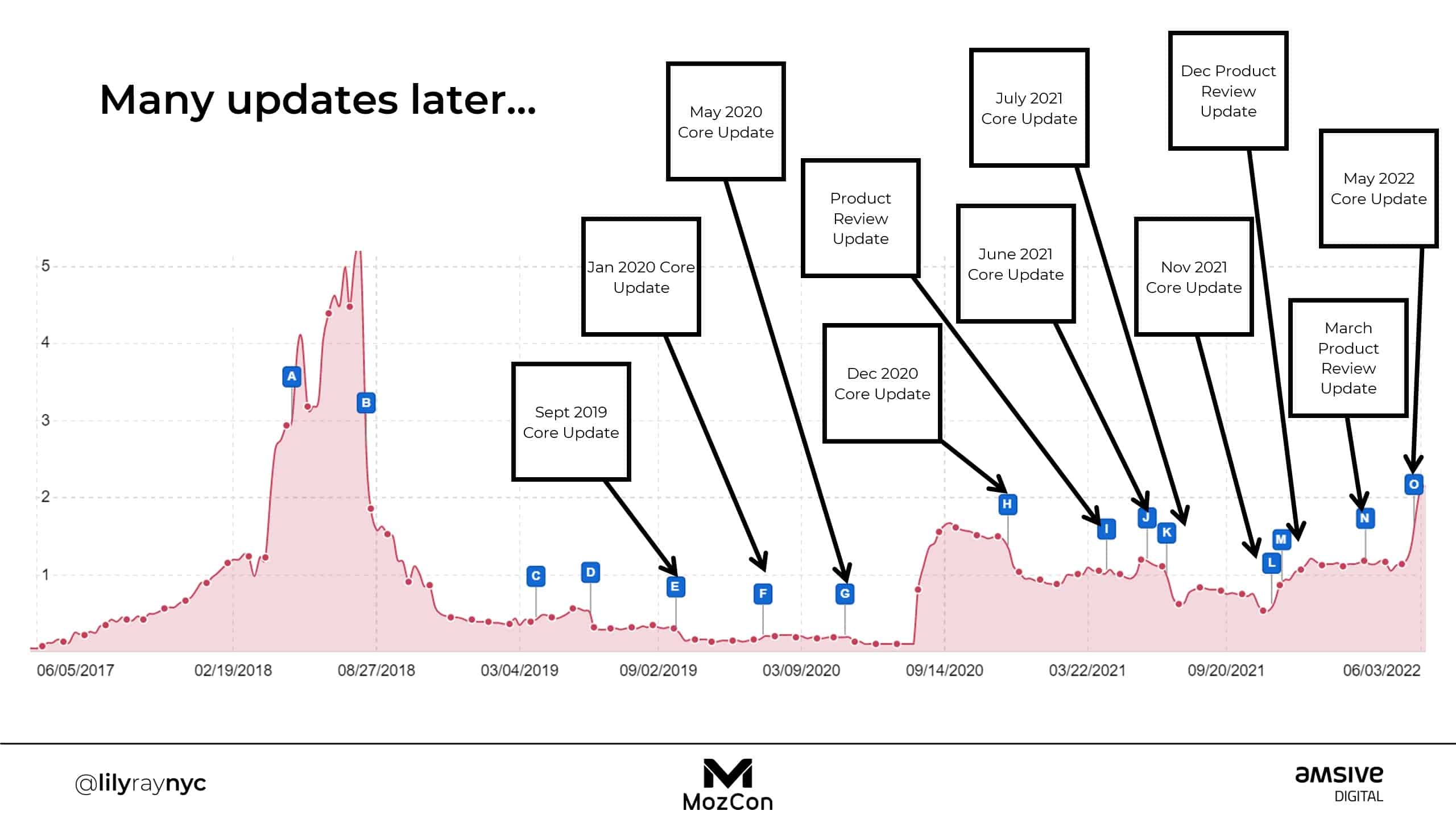
On top of that, there are now Product Reviews Updates, which have been another set of 3 (and counting) algorithm updates in the last year, affecting English language content. Product Reviews Updates add another layer to an already turbulent search landscape. There are some overlaps between the Product Reviews Updates, in terms of them both focusing on E-A-T for better rankings. For example, with the product reviews updates, the focus has been to elevate content written by people who are enthusiasts and experts that know the products well.
In Google’s official documentation about the product reviews updates, it looks for evidence reviewers have spent time with the product, including videos and images. The likely reason: there’s too much affiliate content from authors who aren’t actually trying the products, which creates poor quality results for Google’s users. Google is likely trying to algorithmically understand who actually did the testing and deserves to be elevated in search. It’s possible that we will see Google incorporate similar algorithms into its broader search results in the future, as Google aims to figure out who are the real experts adding real value, as opposed to just repeating what others have already said.
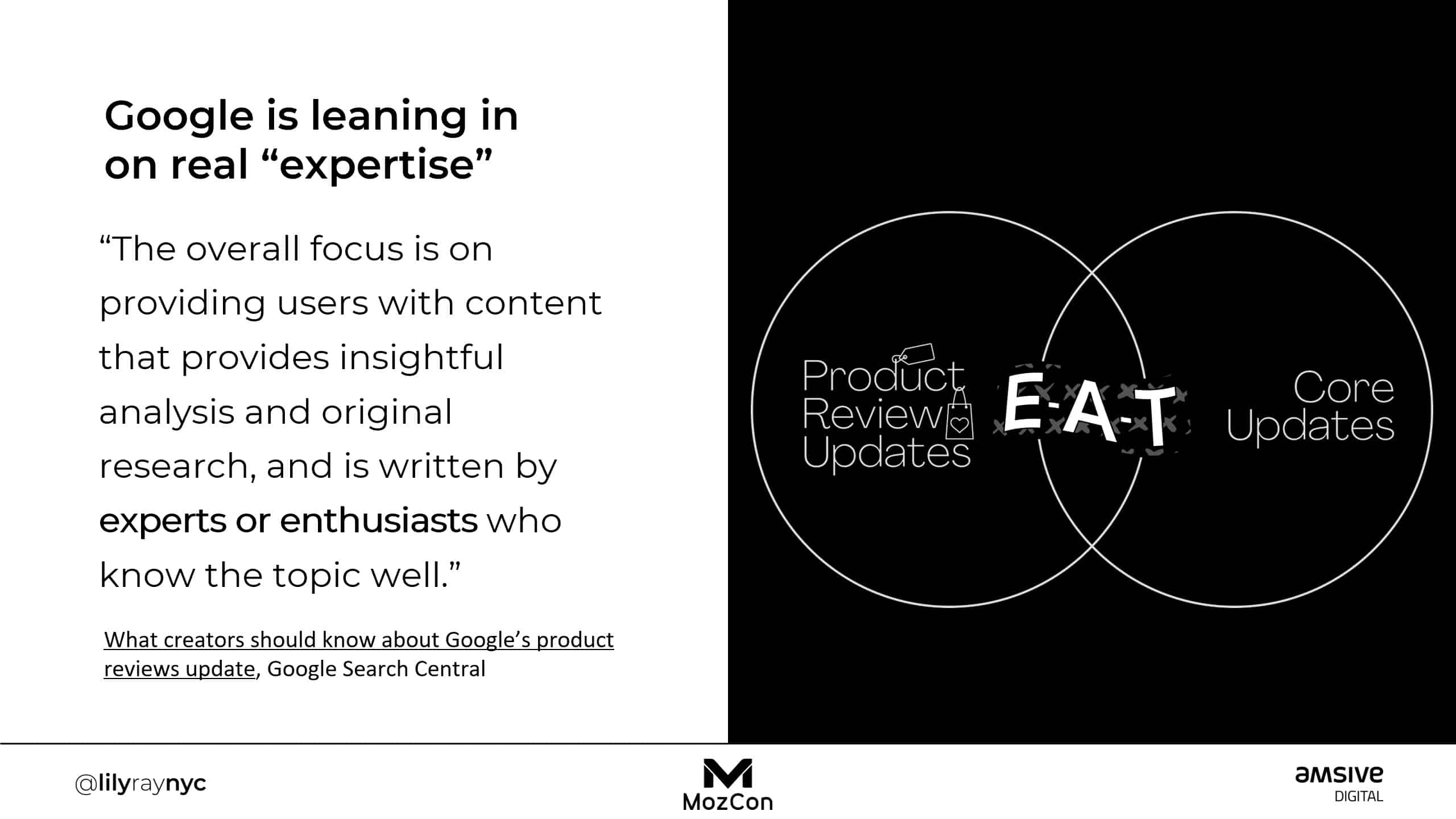
This relates to a patent Google filed in 2020, called “Contextual Estimation of Link Information Gain,” which contains the important notion of what Google calls an ‘information gain score.’ In laymen’s terms, this score enables Google to algorithmically identify when a piece of content contains entirely new material not already included in documents on the same topic. This patent may contain the process Google uses to spot when articles contain a unique perspective, or expert information not offered elsewhere.
The Impact of the Rise of E-A-T
What’s been happening to search as a result of all of these changes? One outcome: there’s been a slow but steady decline among YMYL-focused publisher sites with seemingly good E-A-T. These sites are generally following best practices in terms of demonstrating much of what Google is looking for in terms of E-A-T, but their visibility has still been trending downward in recent years.
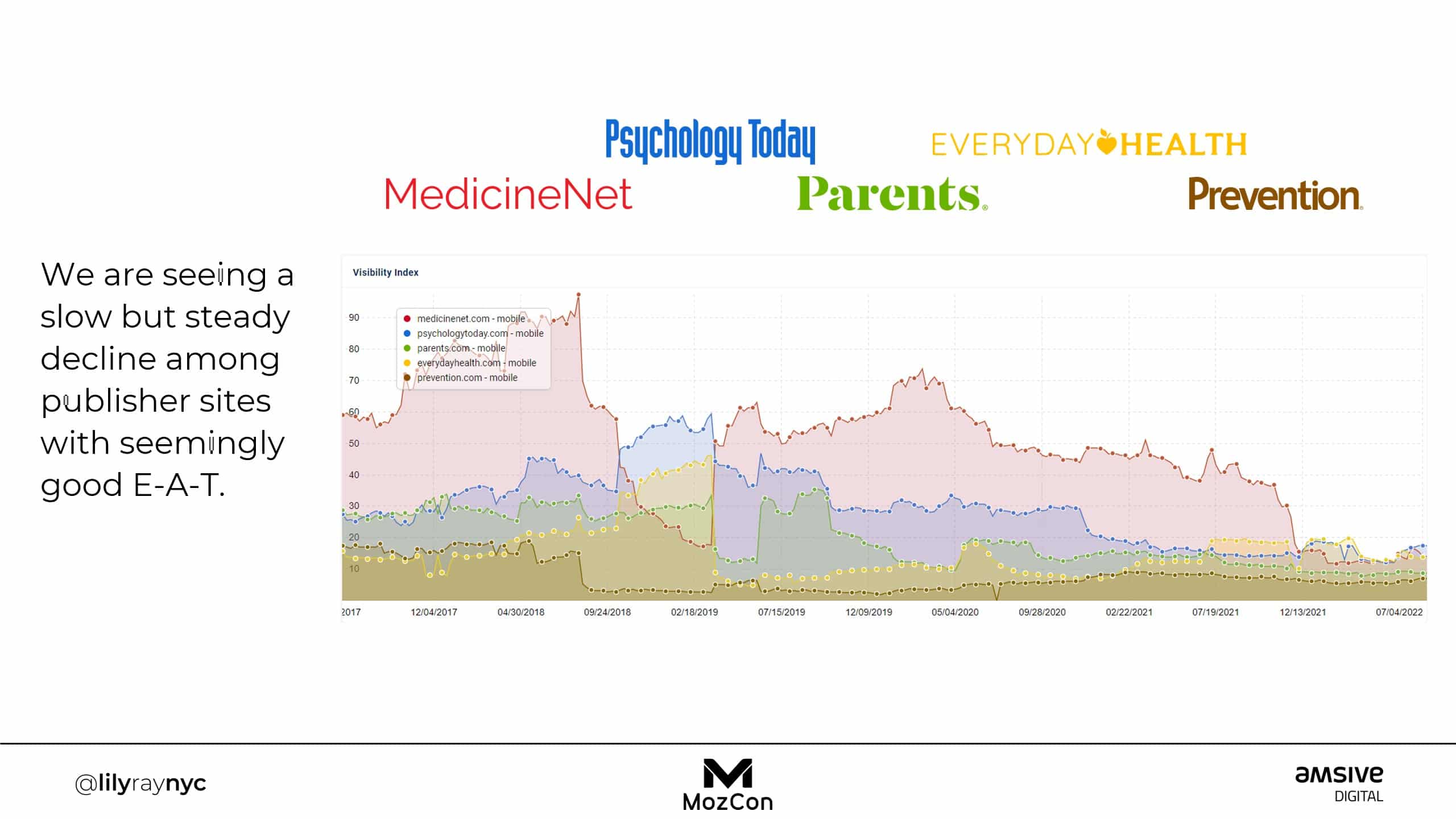
The decline is coupled with a consistent rise of the “real” authorities. For example, the Mayo Clinic ranks number one for many queries, and this effect is exacerbated during times of crisis. When there’s a new COVID-19 variant or other pressing concern, sites like the FDA and CDC tend to rank in top positions, even for many YMYL keywords that don’t have much to do with the crisis itself. In general, these real subject matter experts and authorities have been slowly but steadily gaining visibility in the past few years in organic search.
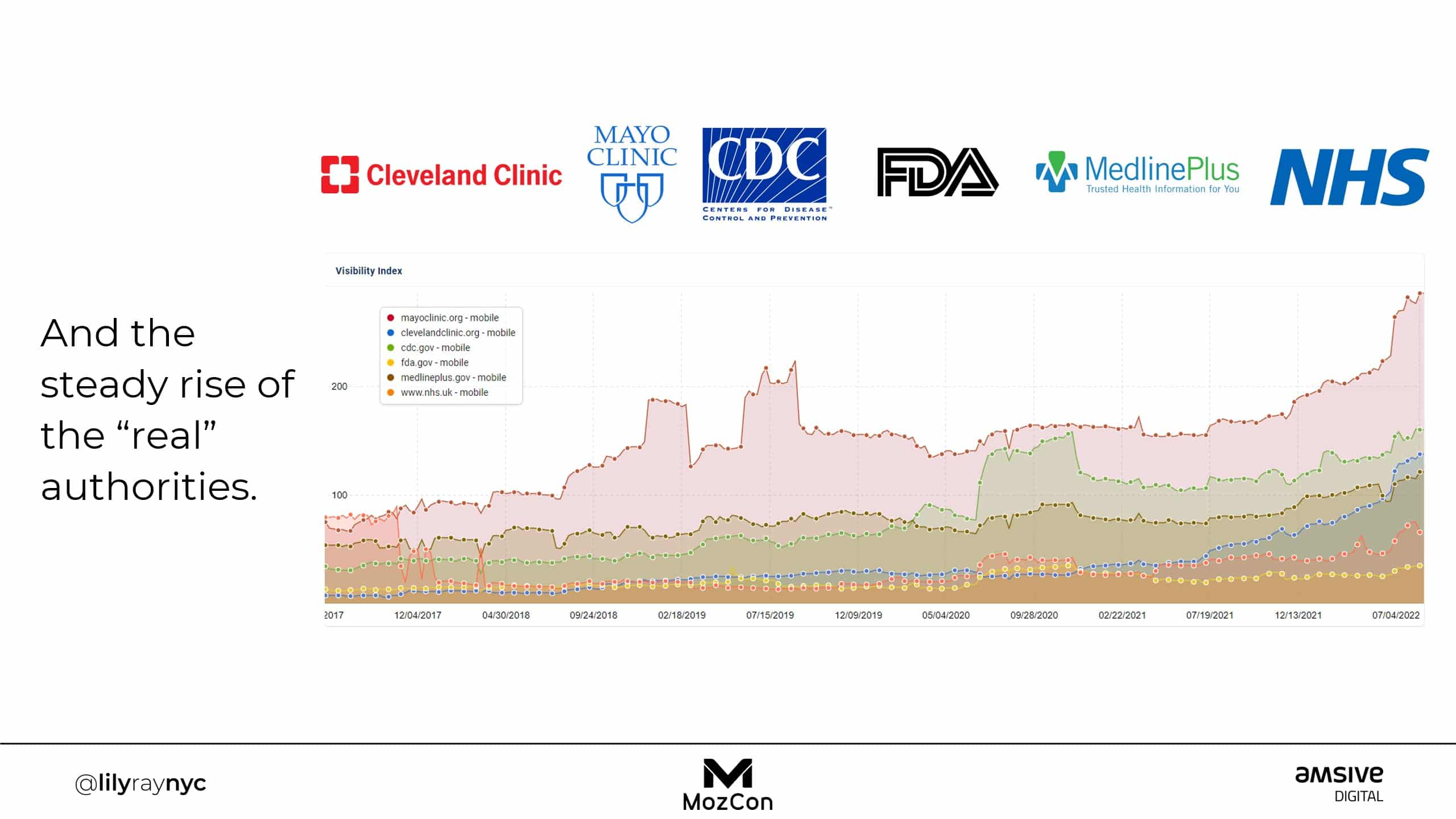
The rise of real subject-matter experts
One major outcome of the rise of E-A-T: Google is likely focusing on identifying and elevating content from real subject-matter experts instead of anyone simply rehashing what everyone else has already written.
Many recognized experts in search are treated as entities. If Google has enough understanding about a person or author, that author will be treated like an entity, which play a major role in the ecosystem, such as the possibility of being included in Google’s Knowledge Graph. Back at PubCon in 2019, Gary Illyes stated, “We have entities for very popular authors, like if you were an executive for the Washington Post, then you probably have an entity. It’s not about the author, it’s about the entity.” So, not necessarily all authors, but authors that are recognizable enough, are going to be treated by Google as an entity.
In 2020, I collaborated with the late Bill Slawski, an expert on Google patents, to write an article explaining the relationship between E-A-T and Google’s Patents. The answer Bill provided to the question of how Google evaluates E-A-T was that instead of evaluating E-A-T by author, individual, or brand, Google likely evaluates E-A-T on the entity level. Google has mechanisms to identify to evaluate who entities are, and E-A-T is most likely evaluated based on who those entities are, and the qualities and attributes Google knows about them.
Within the past 15 years, a few of Google Search’s algorithmic patents have supported this theory, including
- Agent Rank: identity who an author is on a page and rank the article according to who the author is
- Website Representation Vectors: classify website content into different levels of expertise
- Author Vectors: identify who an author is of text without their name being written on the page
- Speaker Identification: identify an author by voice through video or audio content
- Identifying Authoritative Results: based on the query, this search demands authoritative results
If Google is evaluating entities for E-A-T, how can search marketers learn more about entities and the information they hold? Diffbot Natural Language API allows users to better understand and visualize information about entities and their importance within the larger search landscape.

For example, let’s say that someone just adopted a new puppy. They might search for the following:
- How much to feed a puppy
- Why does my dog whine all the time
- Why is my puppy so hyper
- Best guard dogs
- Why does my dog lick the carpet
Cesar Millan ranks number one for all of these queries. Why? Looking at Cesar’s biography within the Diffbot tool, you can begin to visualize him as an entity. Caesar, as an entity, is closely associated with other entities, Cesar’s way, and he is an award-winning expert in dog behavior. Theoretically, a user types in a query about dog behavior, and Google could work to identify which entity has the most E-A-T on dog and puppy behavior. This complex consideration set includes both authors and publications, all treated as separate entities.
Google says in its search quality guidelines that they attempts to evaluate the E-A-T of the website’s contributors, as well as the site itself. This is combined with all other ranking factors to pick the highest quality result. Google is searching for the most relevant entity on this topic as one step in many to determine the best result. Of course, this is not an exclusive process for rankings – it’s one of many factors Google considers when ranking content, such as relevance, content quality, technical SEO, website architecture, performance, and many more. But the process of evaluating E-A-T at the entity level is likely running in tandem and is especially true for YMYL keywords, where E-A-T matters most.
So, what are some examples of real experts that Google’s algorithms are elevating and rewarding for expert content?
These experts have seen significant growth in SEO visibility since early 2021, as calculated by the Sistrix Visibility Index.
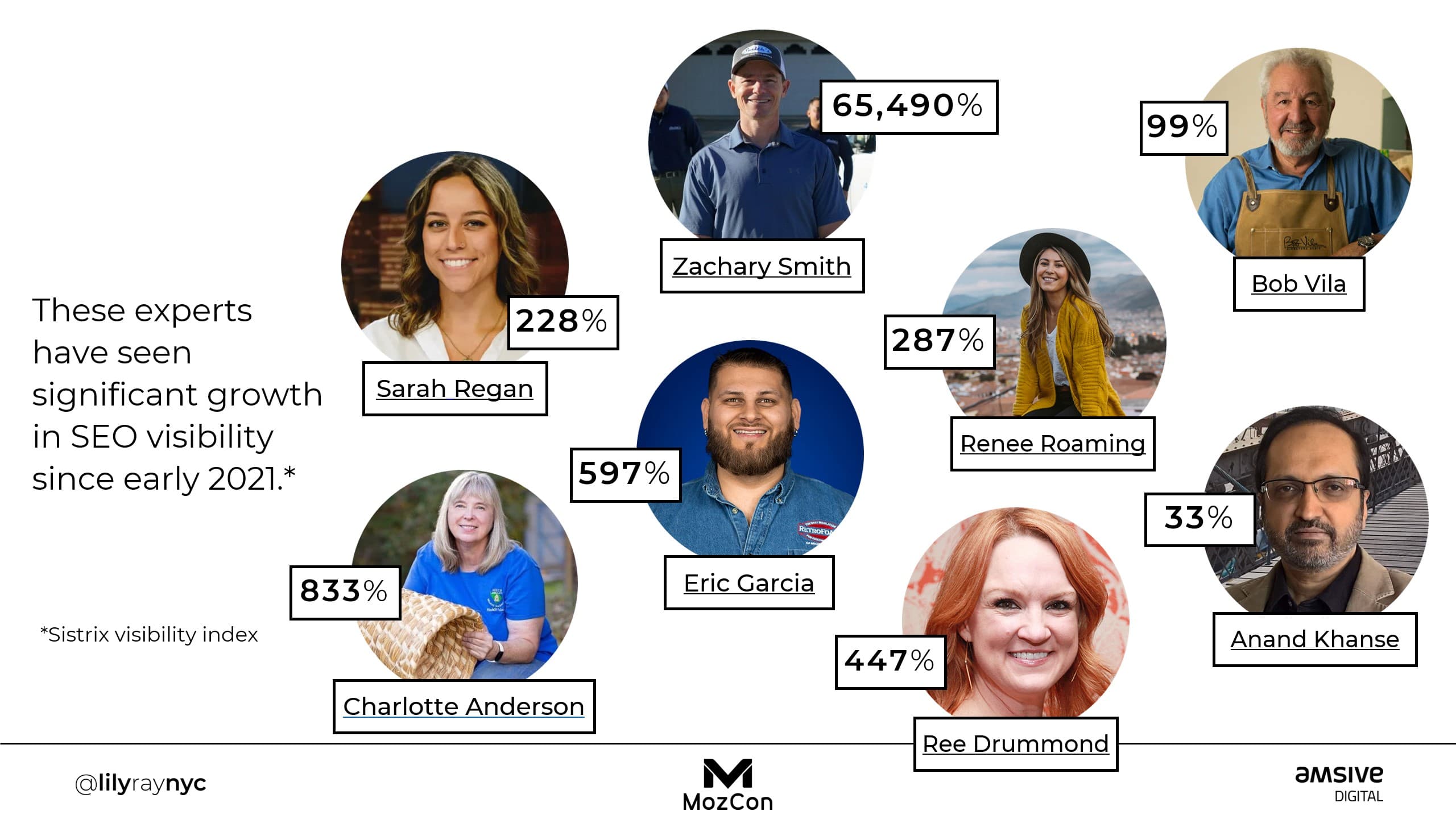
None of these individuals do SEO as their primary career. They each have their own niche areas of expertise and niche sites where they talk about the things that they do all day.
What do these sites have in common?
- The entire site focuses on one niche. This isn’t at all to say that only niche websites rank well, but it’s a testament to Google acknowledging that a domain and author is so focused in one area, it’s recognized as a legitimate subject matter expert in that area. On the flipside, some generalist sites that try to be experts in too many topics, have seen some visibility declines in recent years.
- Each of the previous sites has robust “About Me or About Us” pages. Across the board, every single one is transparent about who they are, why you should trust them, why they are so passionate, how many awards they have won, and how you can get in touch with them. In short, they are clear about who they are and why they are so enthusiastic about their area of expertise.
- These sites also demonstrate first-hand expertise. Almost all of their content is written in the first person and speaks to things they have done and their experiences in the field.
- There is always transparent authorship. Whether they are writing the content, or someone else, it’s always 100% clear who the author is.
- Additionally, they back up expertise with evidence, anecdotes, and real experiences about what they’ve seen out in the world doing the work. They offer a first-hand account of legitimate expertise.
- The experts offer objective advice without pushing their products. While it seems counterintuitive, instead of being sales-y, they are legitimately helping the user and even telling them when they don’t need to hire a professional and can do things on their own.
- In many cases, other sites link to them as a primary source. Even though linking out to other sites and citing your sources is generally a great practice for SEOs and users, these experts often don’t need to because they’re the primary source of information. These are examples of people “breaking the news” and providing original research in their respective areas.
- For those offering product review or affiliate content, the product reviews offer proof of conducting extensive tests. Google has been elevating people who provide language that truly demonstrates that they have spent time with the products, including videos and images showing them using the product.
- These sites include a robust depth of coverage within their area of expertise. Essentially, if you were to use a tool that explores “People Also Ask questions” to visualize all of the different questions people are asking in their niche, the experts have already done a great job of providing content on many of those different topics.
What does real expertise look like?
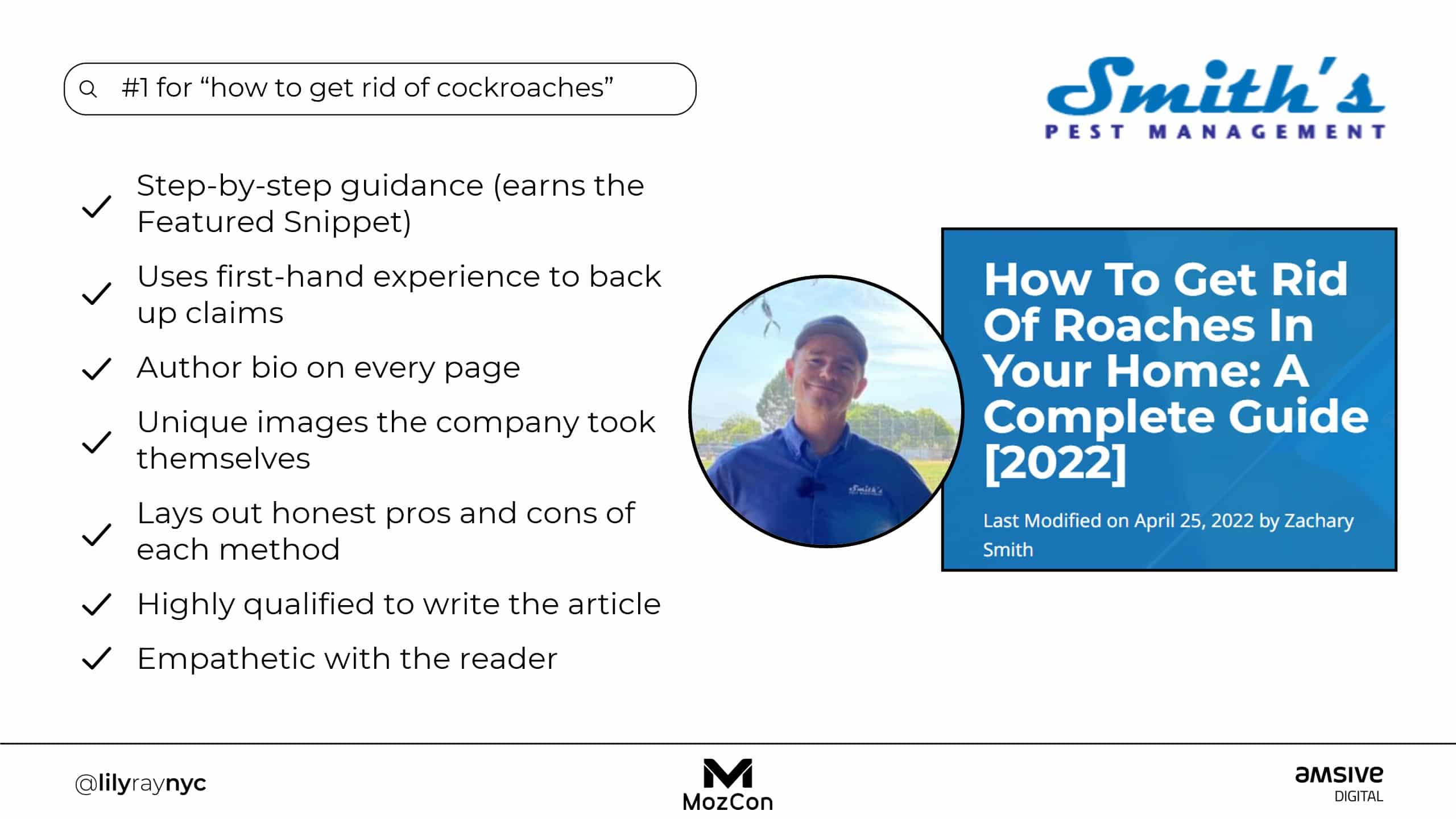
Zachary Smith from Smith’s Pest Management is an outstanding example of what it looks like to demonstrate real expertise throughout one’s content and SEO strategy. His content is generated primarily from the things he and his team have experienced as pest control experts, and the content itself demonstrates the level of their expertise, down to the photos they often took themselves while on the job.
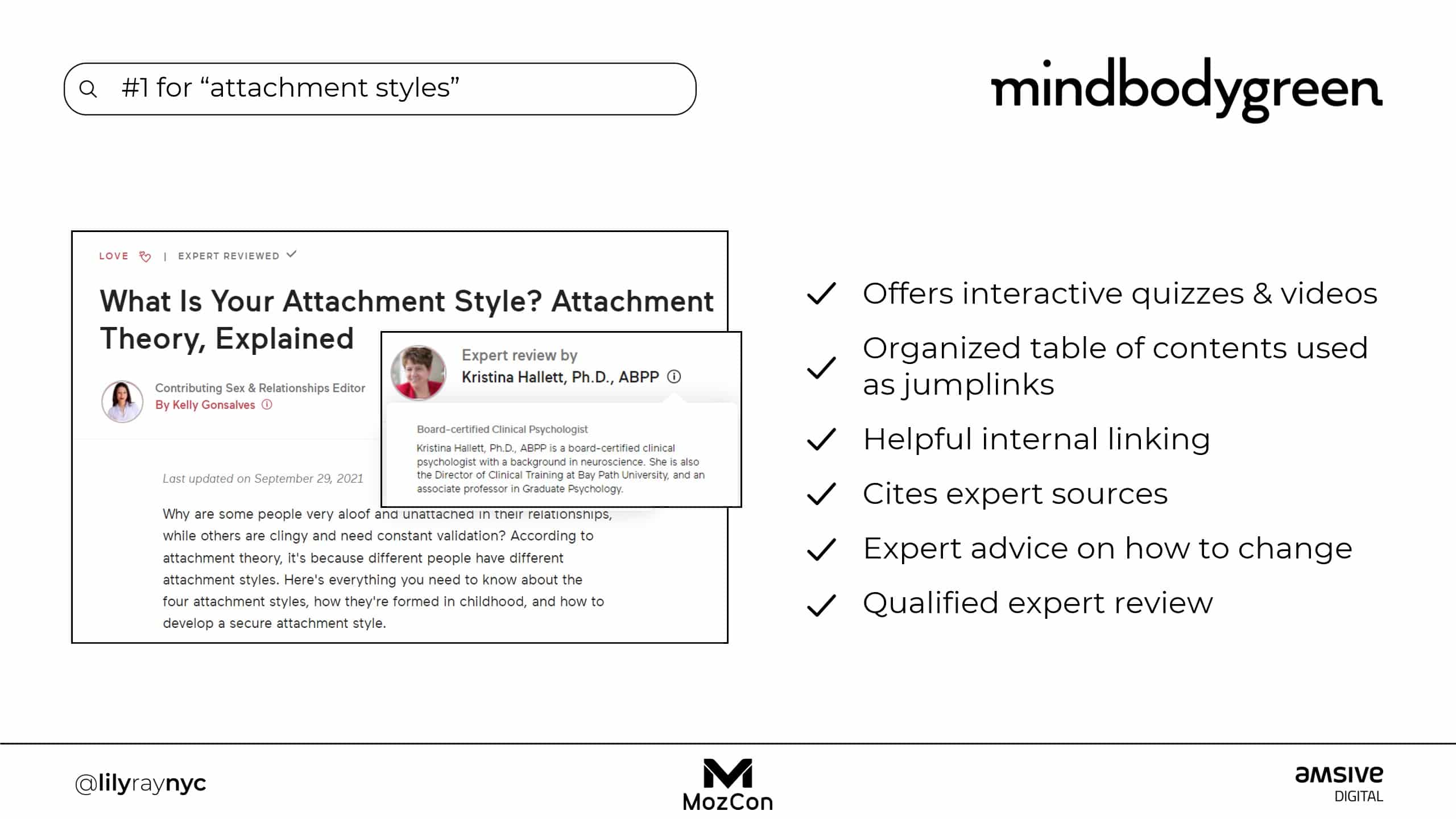
Mindbodygreen is a site that demonstrates substantial expertise throughout its content, and loops in expert review whenever necessary. This is true for the above article, which ranks #1 for “attachment styles,” where help from an expert Clinical Psychologist is necessary to provide trustworthy, expert information. Mindbodygreen has seen a massive increase in SEO visibility in the past few years, recovering from negative impacts from core updates in late 2018 and early 2019.

Rene Roaming, a travel blogger, demonstrates significant expertise in her article about taking road trips in Utah. She provides substantial evidence that she has done the work required to provide advice about road tripping in Utah, with robust content that takes all factors into consideration, plus photos of her at the parks, and more.
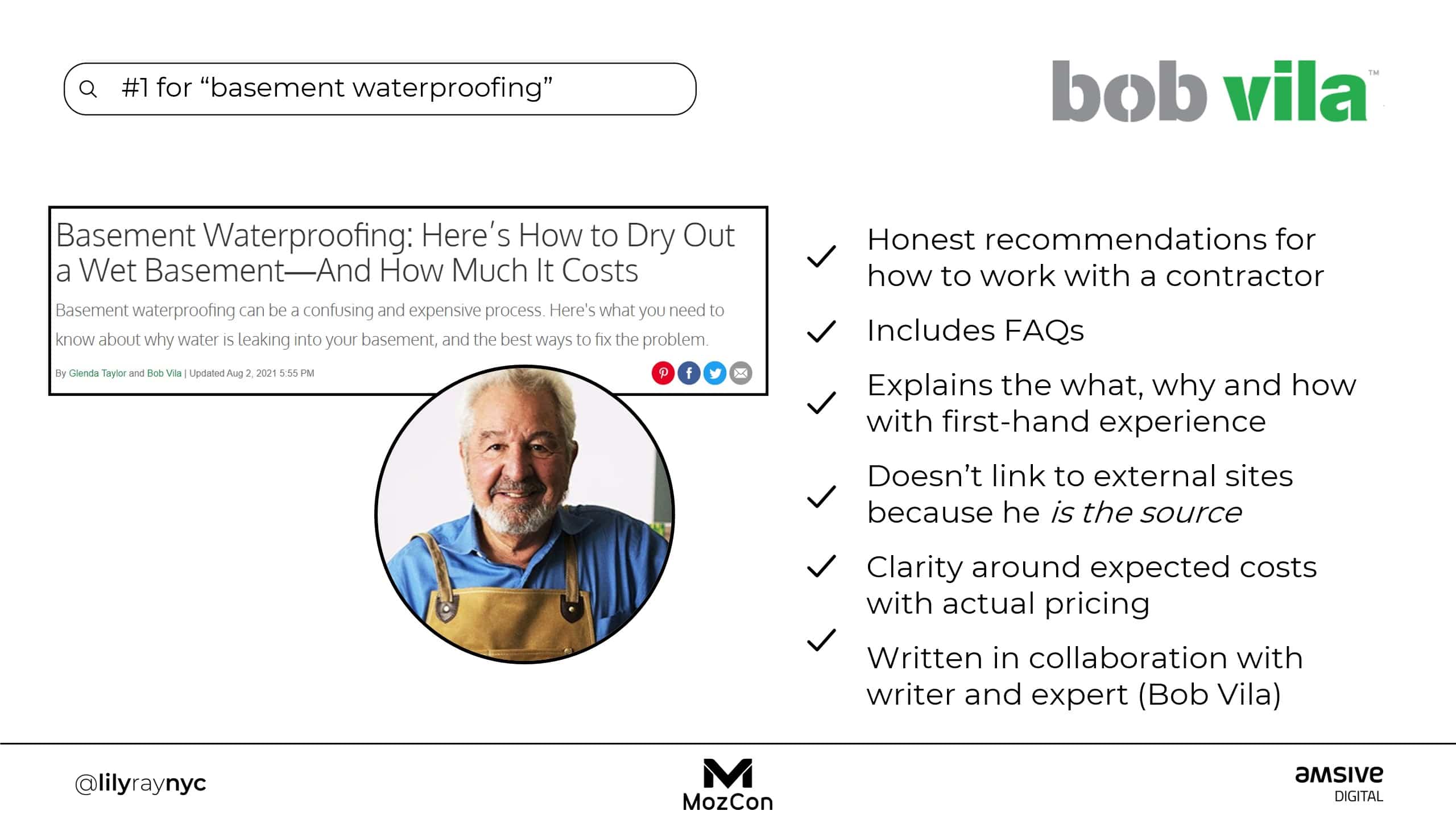
Bob Vila is another site that’s seen significant SEO growth in the past couple of years. The content strategy focuses on Bob’s expertise as a home contractor, and Bob is often cited as either a primary or co-author of much of the site’s content.
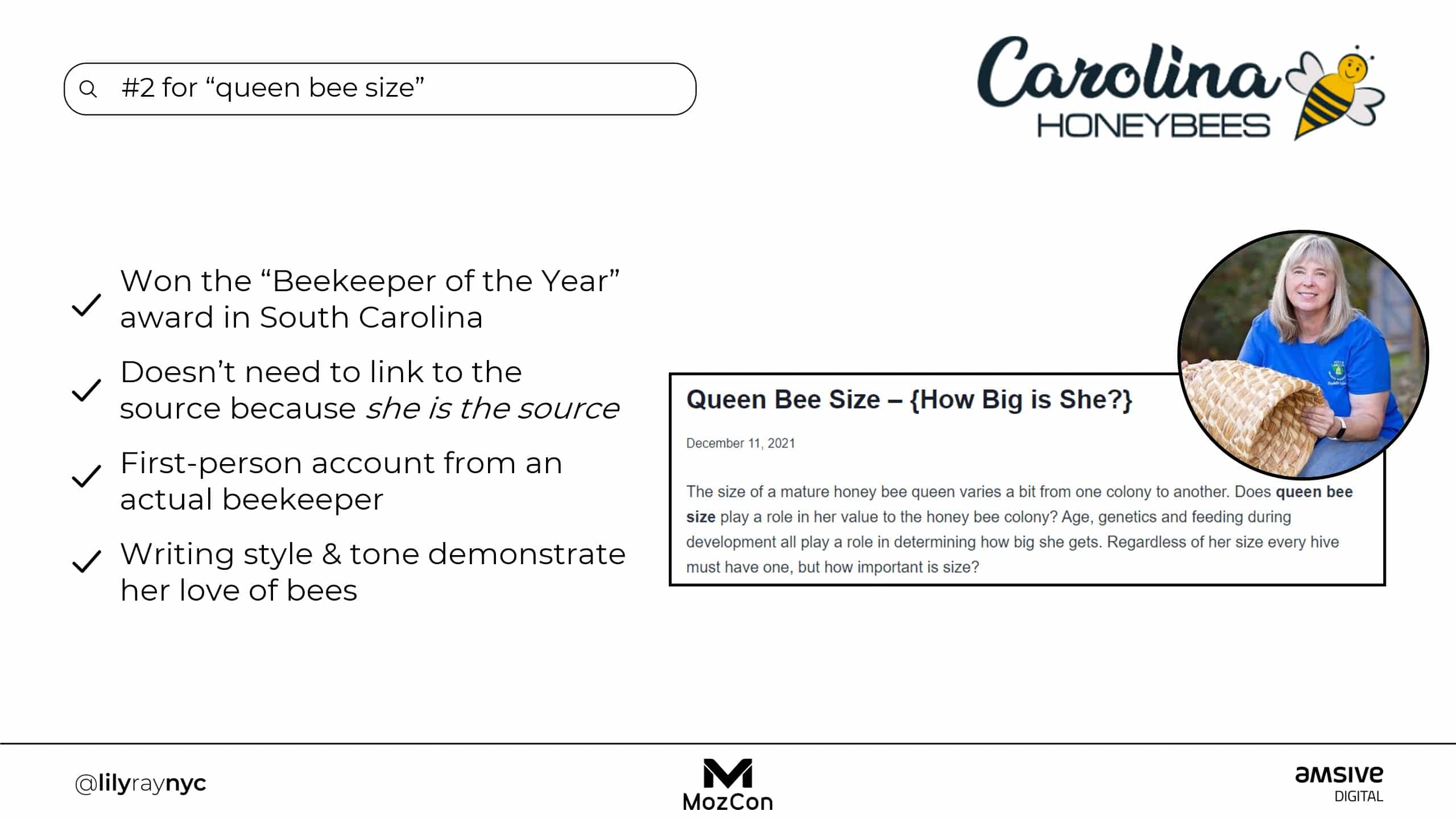
Charlotte from Carolina Honeybees is an award-winning beekeeper whose site speaks to the many things she’s learned in her time as a beekeeper. She is a trusted source of information within this niche given her depth of experience in the field, plus her enthusiasm for bees.
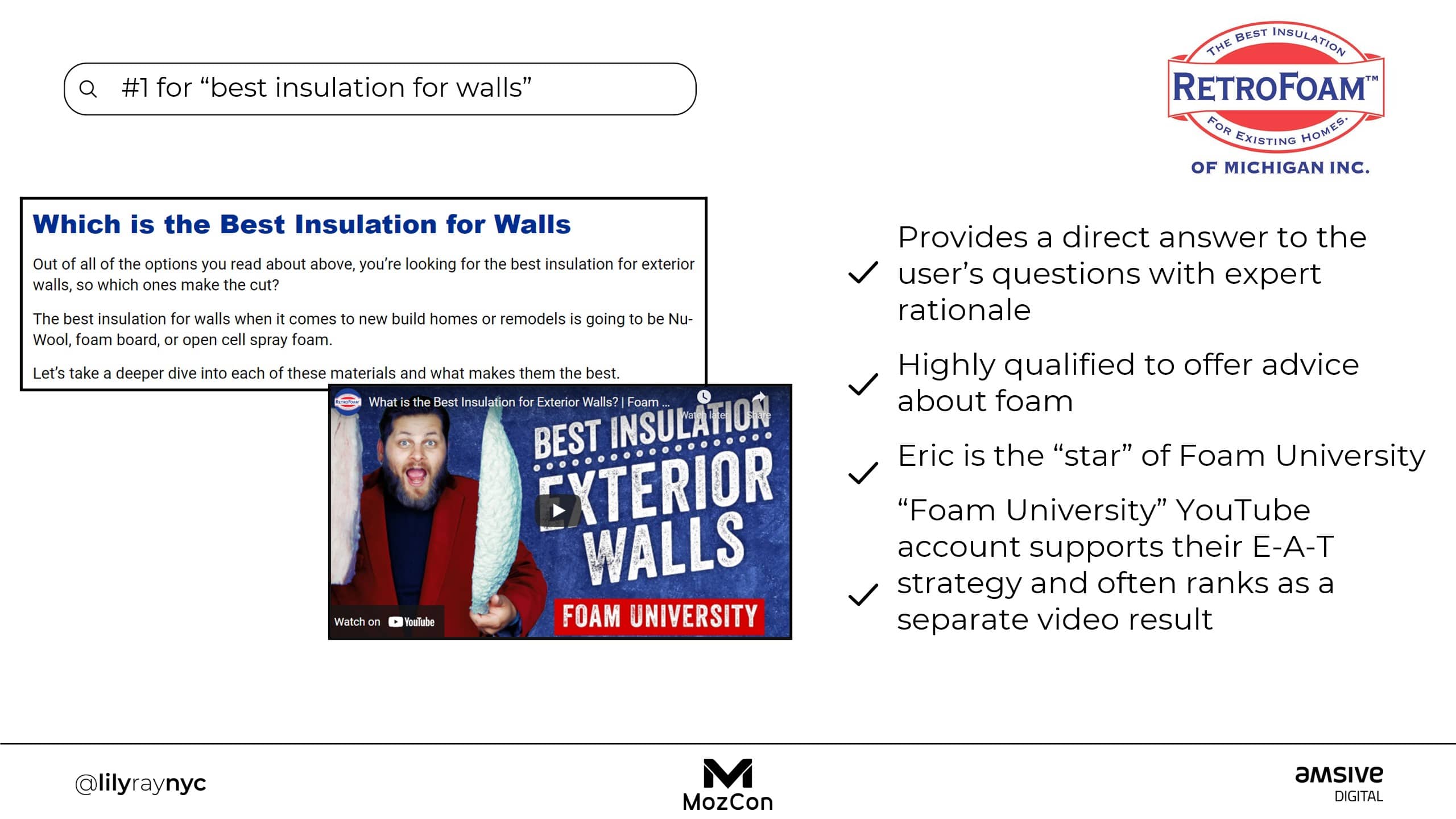
Retro Foam of Michigan is a company that highlights its expert contractors throughout the site, and especially in its YouTube series “Foam University,” where the company also ranks well organically. Its star, Eric Garcia, demonstrates strong E-A-T on topics related to foam and insulation, and Google often ranks the site’s content in top positions in both organic search and in YouTube video thumbnails for foam and insulation queries.
Where should your site begin? Here’s where to start as you build E-A-T, especially expertise.
How to analyze and improve your site’s perceived expertise
Tip #1: Compare the performance of your categories, subcategories, tags and/or breadcrumbs to see where your site currently demonstrates E-A-T.
Tip #2: Work with internal experts and build out their SEO presence, and transcribe their expert video content and podcasts as text. Build a digital presence for the experts that work at your company, with their name being the target keyword.
Tip #3: Provide thorough, clear, and consistent author and expert bios. Try to use the same bio across various sites.
Tip #4: Provide original research, not just rehashing what others have written.
MozCon 2022 presentation slides
[slideshare id=252168594&doc=mozcon2022lilyray-powerpoint-finalfinal-220712184304-37a94b4e]
Presented on July 13, 2022 by Lily Ray at MozCon 2022.
Stay connected.
To learn the latest in SEO, read our expert team’s freshest insights and explore our full suite of SEO services to see how we grow brands and bottom lines as a leading digital marketing agency. Have a question? Reach out to @lilyraynyc on Twitter.
Want to know more now? Read Google May 2022 Core Update: Winners, Losers & Analysis
